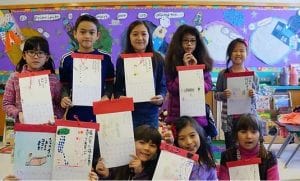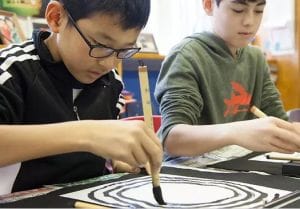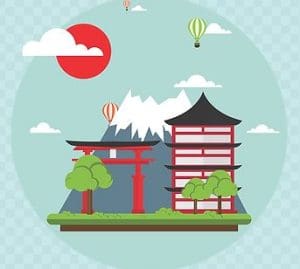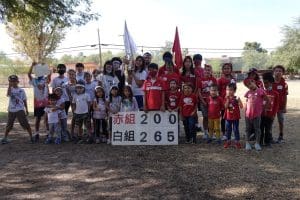The Biblio Lotus Team is delighted to present this interview series, hoping to elevate AAPI (Asian Americans and Pacific Islanders) communities' voices and celebrate their culture. The interviewees are in different fields and from various backgrounds, but their dedication to AAPI histories and cultures helps form our diverse and dynamic community in Pima County.
This interview is brought to you by Paige C., Flowing Wells Library.
In August 2015, the Tucson Japanese Language School, run by Hitomi McKnight and Minami Espinosa opened its doors. The school teaches Japanese on Saturday mornings from 9 to 11 am, offering four class levels to its students. Many of the students come from families with one or more Japanese parents, however some students have no Japanese language background. Students ages 5 to 18 are split based on language level into four classes: 1A, 1B, 2, and 3.
Well aware of the desire from some adults to learn Japanese, the school also created the Nihongo Café. The café meets every second and fourth Wednesday of the month from 6 to 7pm and involves volunteers from Anjo City in Aichi, Japan. At this café mostly Japanese is spoken with the intent to help learners improve their Japanese language skills.
I recently visited the school—held in the International School of Tucson at 1701 E. Seneca St—to sit down with director Hitomi McKnight to ask her a few questions about the school’s past, its present, and its hopeful future.
What brought you to create this school?
During preschool, I had a long time with my two and four year old daughters and we used all Japanese in the house. And then they started going to school. A real, normal English school. They’d lose time to use and hear Japanese. We had a Japanese play group—a Japanese mom with children—on Wednesday mornings. We got together, sang a song, and did Japanese characters or crafted together so we could teach our kids Japanese culture and languages.
I know we have a big Japanese school in Phoenix. But it took two hours, or one and a half, to get there. We always wanted to have one in Tucson, so that’s the beginning of thinking about it. I know many of my friends and Japanese moms were always saying they wanted to have a school here. A friend and I started to look for a place, first starting with the Parks and Recreation Department. The price was a little too much for us. We are a volunteer group and didn’t have the foundation to run the school. At a church they offered one room for free but we wanted to have multiple rooms for different Japanese levels, at least three or four classrooms. We went to so many places in Tucson to find a good facility. Finally, the International School of Tucson said they wanted to help us and offered a good price.
What do you think people find to be the benefit of having this school in Tucson?
As a Japanese mom it’s hard to teach Japanese to my own kids because kids sometimes won’t listen to mom. But if you, as a teacher, teach, it is easier. So the learning hiragana, katakana, and kanji – especially as they get older they have more, I don’t know... they want to fight more. So if we can say “It’s homework from your teacher, you have to do it” then they will do it. It’s definitely a benefit for the parents for them to have Japanese homework at home. We can follow that pace and we can teach using their material. The teacher also knows the level of students’ Japanese so they provide study material that matches the students. Our school does not go by ages just by level of Japanese.
There’s the Class 1A, 1B, and then...
... 2, 3, and we used to have a Class 4 for a middle school/high school age student. We don’t have enough students to open the Class 4 now, but we are still accepting this age group. We also have a Japanese Division. We opened Japanese Division in August 2018, which is designed for students who are new to the Japanese language or don’t have a Japanese background.
Are you wanting to offer things for adults interested in learning Japanese?
When we participated at the Tucson Japanese Festival, many people came to our table and asked if we were offering anything for adults. We didn’t have anything at that moment, because we always have a shortage of staff. We felt as a community we should offer something because there’s a need, so we opened the Nihongo Café.
We have some extra classrooms here on Saturday morning. When parents drop their kids here, they have two hours to wait to pick them up. Some of the parents want to learn, if not native Japanese, more Japanese, and help others learn the language. I thought okay, maybe just we open one room for the Nihongo Café so we can offer hot tea and coffee and they can practice having a conversation.
While the kids are doing the classes, the adults came and practiced. An adult can bring five dollars as a donation if they can and join the conversation group. We made a basic group – kihon (きほん) – and advanced. So two classes, one hour each. They can stay for one, or both. We were doing that for a few months. When Covid hit, we switched to 100% online using Zoom. It’s still going on. We couldn’t keep going with our normal stuff so it’s just volunteers running the Nihongo Café right now.
One person who studied English at the U of A went back to Japan and now he is living in Aichi prefecture. He is doing volunteer work—international volunteer work—in Japan. It's online so he can help. He joined Nihongo Café to teach, to help, and to talk with American people who want to learn Japanese. They’re doing a group meeting twice a month, they can set a private, individual conversation session. They have a list of available times and American people can book the meeting.
Do you accept people who are fluent in Japanese as volunteers?
Yes, we are always accepting. They can email us or connect with us on Facebook.
If you had all of the resources possible, what would your dreams for this be?
To continue what we're doing. People enjoy coming here and sharing information. It’s a good place to meet other Japanese people. If you’re new here from Japan, you want to talk. You want to use Japanese with other Japanese people. So I think having a small Japanese community here is very beneficial.
Can you tell us about any events you host?
We have a big sports day, undoukai (うんどうかい). Undoukai is always fun. I think that’s the most exciting event at our school. Students really enjoy competing, running, or playing tug-of-war. Students also cheer for their parents. Parents do the tug-of-war or throw a ball in a basket (たまいれ, Tama-ire) and they compete with each other. Sometimes parents enjoy it more than the kids, and they have muscle pain the next day, but they really enjoy that. It’s open for the public. It’s like a real Japanese undoukai.
And last question, what are you reading right now? Or is there an author you go back to?
To be honest, lately I don't have time to read a book for fun. But I did use Allen Say’s books to teach Japanese at a charter high school. I also enjoyed picture books by Taro Gomi, Tatsuya Miyanishi, and Eric Carle, that that can be read in both English and Japanese to my kids.






